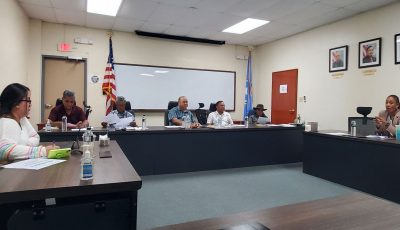Contractor’s lien application on IPI’s hotel-casino project denied
U.S. District Court for the NMI Chief Judge Ramona V. Manglona denied as untimely yesterday the application for a mechanic’s lien filed by a contractor on Imperial Pacific International (CNMI) LLC’s hotel-casino project and on the land that it sits on.
A mechanic’s lien refers to a security interest in the title to a property for the benefit of those who have supplied labor or materials that improve the property.
Manglona said that Pacific Rim Land Development LLC sat on its rights, and consequently lost the opportunity to obtain a mechanic’s lien.
She said mechanic’s lien statutes are designed to protect contractors and suppliers of construction materials by providing a unique remedy in cases of non-payment by owners of construction projects. However, the judge said, the right to a mechanic’s lien is subject to filing deadlines that are strictly enforced to protect the rights of third parties from unknown encumbrances on property.
In the CNMI, Manglona said, these deadlines are triggered by completion or abandonment of contracted work. “Contractors know when and how they have performed and they know when their bills go unpaid,” she said.
Moreover, the judge said, the CNMI mechanic’s lien statute incorporates a notice requirement for the shorter 60-day filing period, as compared to the generous year plus 60-day deadline in cases without valid notice.
“It is not unjust to require a contractor who knows all the facts necessary to trigger a filing deadline to file a timely application,” Manglona pointed out.
Manglona held probable cause hearings on Pacific Rim’s application on Dec. 29, 2019, and Feb. 11, 2020.
According to court records, Pacific Rim and IPI entered into a construction contract on Feb. 13, 2018, for the Pacific Rim to build a hotel-casino complex in Garapan. Pacific Rim eventually stopped working on the project because it says that IPI did not pay it the amounts owed under the contract. The parties then executed a notice of mutual termination on Sept. 21, 2018. On the same day, IPI executed a promissory note in favor of Pacific Rim for $11.3 million, which provided for a payment schedule over the next nine months, with the entire amount to be paid on or before June 15, 2019.
One year after the two agreements were signed, Pacific Rim sued IPI for breach of contract and breach of promissory note, saying that IPI owes it $5.65 million. On Nov. 19, 2019, Pacific Rim filed an application for a mechanic’s lien.
After a series of motions, Pacific Rim filed a second amended complaint and second amended application for a mechanic’s lien on Dec. 12, 2019.
IPI, through counsel, opposed the lien application, arguing that it is untimely.
In her order denying Pacific Rim’s application, Manglona said the CNMI’s mechanic’s lien statute provides two methods to determine the deadline for filing a lien application, both of which are calculated from the date of completion of the work on the improvement.
Pacific Rim argued that the term “completion” means completion of the entire project, while IPI argued that it means completion of the contracted work at issue in the lien application.
Manglona said using Pacific Rim’s definition, the clock for filing has not yet started as the hotel-casino complex is not yet substantially completed or abandoned.
If IPI’s interpretation is correct, then Pacific Rim’s application is time-barred under the first method of calculating the filing deadline, Manglona said.
Even if Pacific Rim had not substantially completed all work under the contract by that date, it was released from those obligations and allowed to abandon the project, the judge said. Therefore, the timeframe for filing a lien application turns on the Sept. 30, 2018 completion date.
“The fact that the entire casino construction project is not yet completed or abandoned is irrelevant,” Manglona said.
On the question of timeliness of Pacific Rim’s application, Manglona said the CNMI mechanic’s lien statute provides two methods of calculating the filing deadline for a lien application, one with delivery of a valid notice of completion and one without notice.
Manglona said the notice of mutual termination provided proper notice to Pacific Rim that its obligations under the contract were complete.
The judge said she finds that it is a valid notice of completion and, pursuant to the statute, the timeframe for Pacific Rim to file a mechanic’s lien application expired on Nov. 29, 2018, 60 days after delivery.
She noted that Pacific Rim filed a lien application with the court on Nov. 19, 2019, with the present application filed on Dec. 12, 2019.
With respect to Pacific Rim’s lawsuit, Manglona entered a judgment last Thursday in the amount of $5.65 million in favor of Pacific Rim and against IPI as to the claim of breach of contract.
Manglona finds that there is no just reason for delay of the entry of judgment on Pacific Rim’s claim for breach of contract on the promissory note.
IPI recently filed counterclaims against Pacific Rim, accusing it of hiring nonprofessionals to work on IPI’s casino-resort project in Garapan.



























